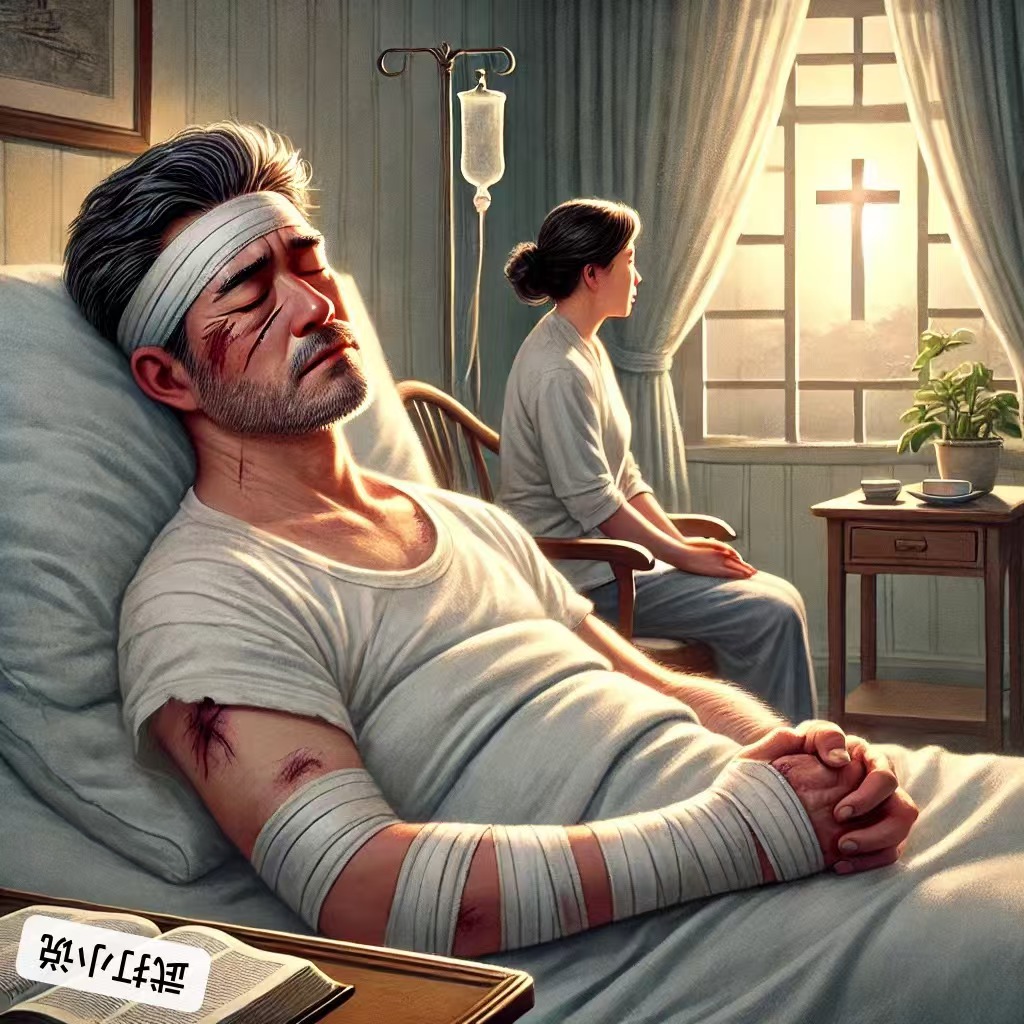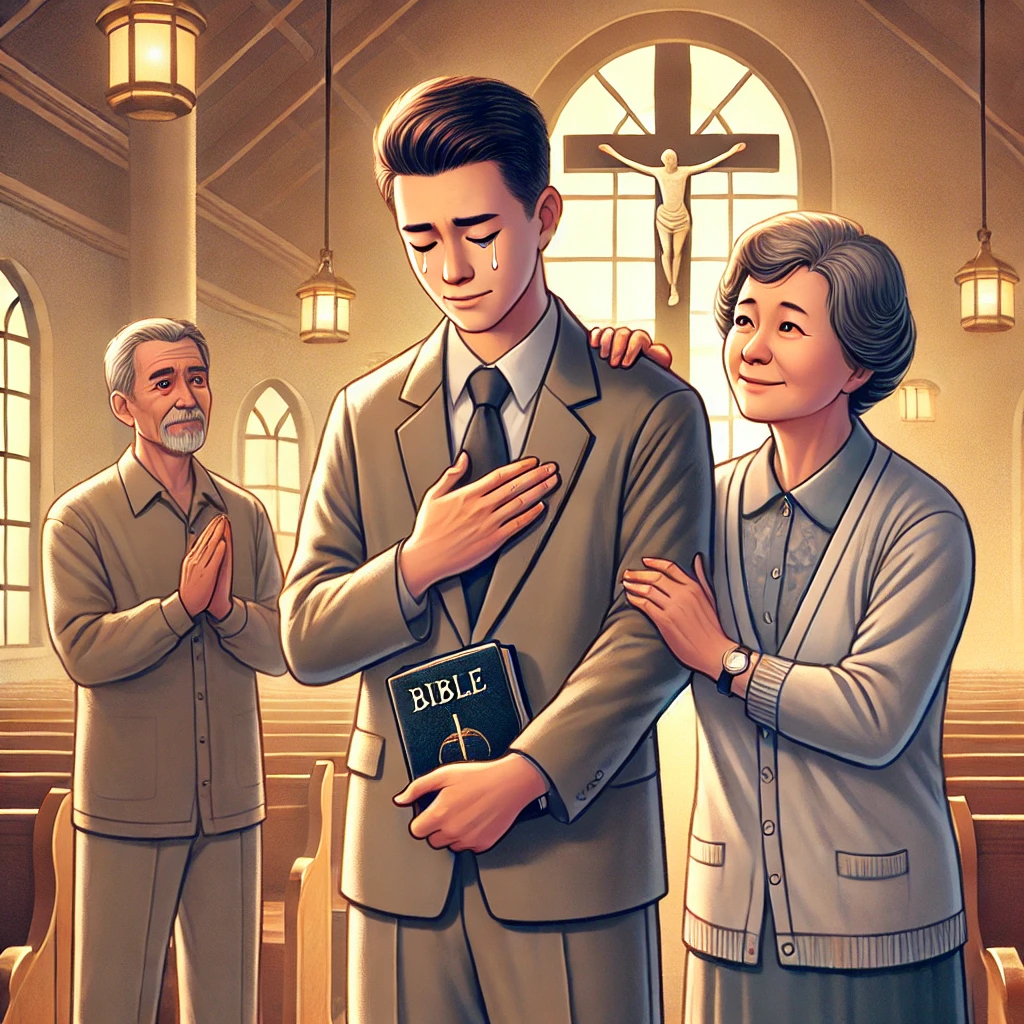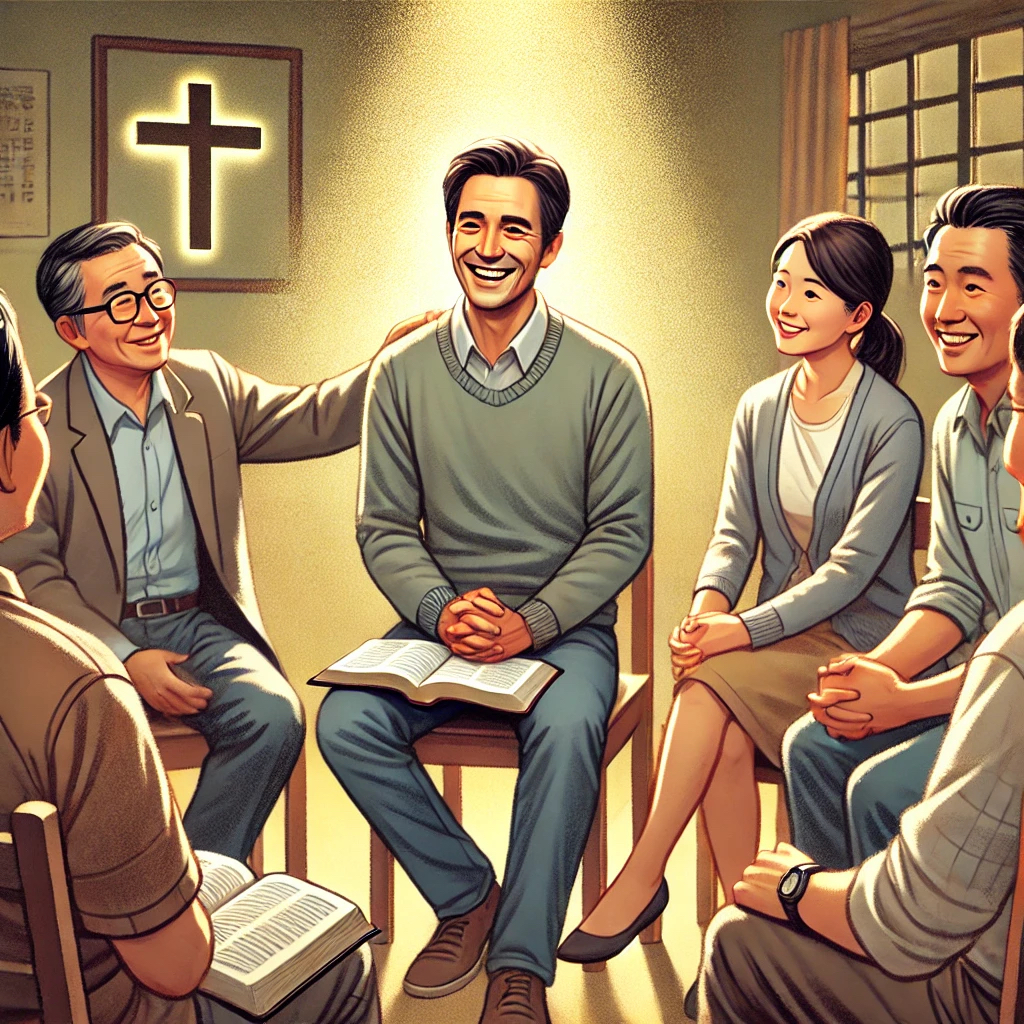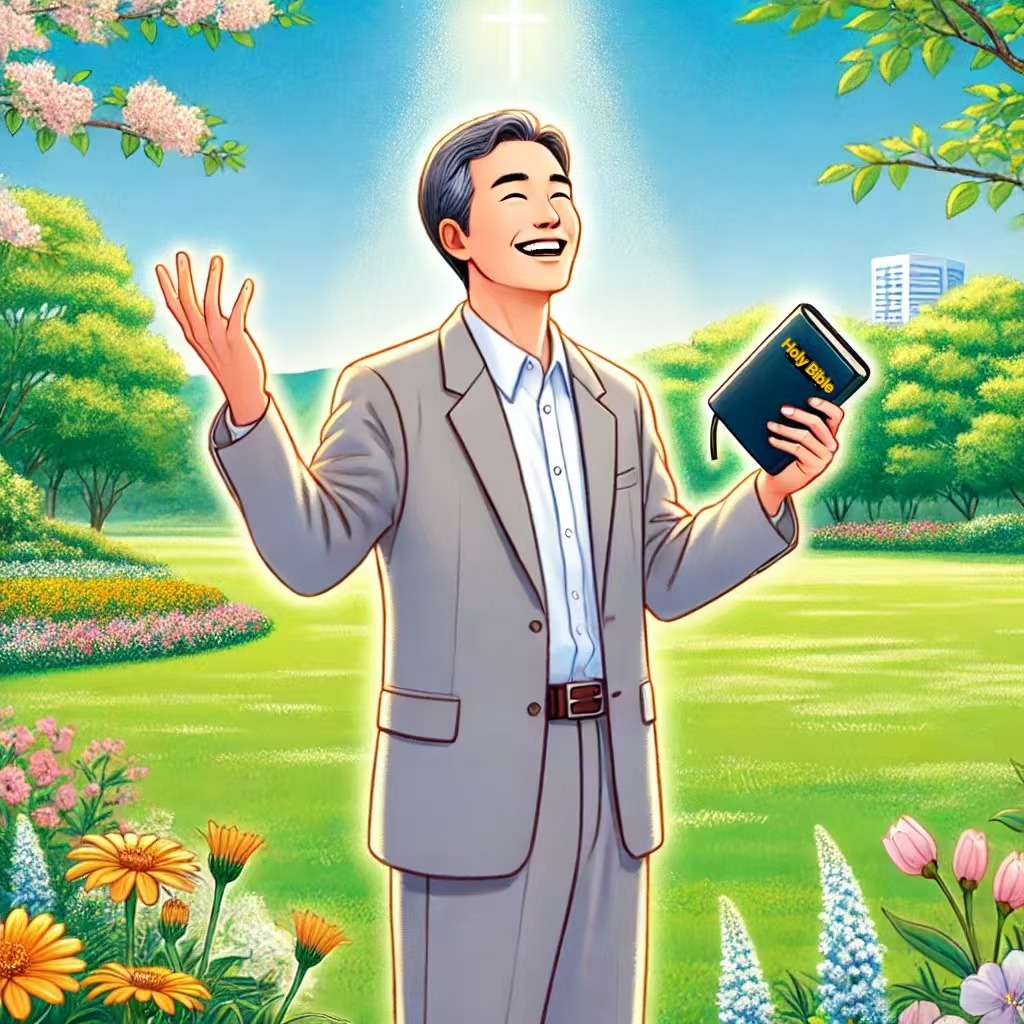顾弟兄比我大4岁多,大学毕业后一直在山东半岛东北部的一个城市工作。信主20多年来,他的生命经历了巨大的转变。今年过节期间,我们见面聊了许多信仰中的挣扎与突破。他非常希望我能将他的一些体会分享出来,让更多弟兄姐妹在主里共勉,愿大家都能因主耶稣的恩典而得到更新。
一、前半生的迷失:体贴肉体带来的败坏—–从放纵到迷茫,灵魂被罪束缚
顾弟兄今年刚刚退休,几年前刚刚做完心脏支架手术,从年轻时信佛到后来被主拣选成为基督徒,已经走过了20多年的时间。回忆起自己前半生的经历,他心中感慨万千。虽然他信主多年,但年轻时体贴肉体的生活方式依然给他带来了长期而深刻的影响。
顾弟兄从小就是个嘴上要强、内心好斗、永不服输的人。20多岁时,他急于证明自己,总觉得社会规则就是“弱肉强食”。他看不上循规蹈矩的人,认为那些人缺乏进取精神。年轻时,他凭着一腔热血和勇敢无畏的态度,在社会上闯荡,做了许多冒险且危险的事情:喝酒、飞车、打架、纵情笙歌、与朋友在娱乐场所厮混,身边的“哥们”一个比一个“社会”。在他看来,这样的生活虽然带有风险,但充满刺激感和成就感。他的座右铭是:“男人嘛,要敢于冒险,不怕死才能活得精彩!”
但在这些放纵的行为背后,是逐渐侵蚀他心灵与身体的罪,那时候他还没有接受基督作为个人的救主,但奶奶教会的同工来他家时得知他的情况后也给他传福音,并提醒过他有时间去教会学习按照主耶稣的样式生活,而顾弟兄却完全忽视了这种提醒,依旧把放纵的生活当成了自由的象征,把不断追求肉体的快乐当成了追求成功的方式。他酗酒成瘾,沉迷于宴乐,甚至在婚后仍然没有停歇,虽后来迫于奶奶的压力他也随他的妻子参加每周的教会聚会,但也是“身在曹营心在汉”,一走出教会便会以“男人的自由”来为自己的豪放行为找理由,认为自己所做的一切都无可厚非。
然而,这样的生活虽然带来了短暂的满足,但每当夜深人静时,他感到一种无法名状的孤独仿佛巨浪一般涌上心头。喧嚣散去、灯火熄灭,内心深处那种被罪吞噬的空虚感就愈发强烈。他明白,酒精和欢笑只能暂时麻痹他的感受,却无法填补心灵里那巨大的黑洞。每次与朋友们“狂欢”之后,内心反而更加疲惫和空虚。
随着时间的推移,他参加聚会敬拜后越来越感觉对不起牧师的教导,甚至感觉自己不配拥有耶稣基督的救赎,可他却始终下不了决心在救赎和自己的“罪”之间做出确切的选择,那么多年以来总是处于一种对自己罪的宽容态度,舍不得彻底悔改,一到聚会结束后便又被朋友们拉去参加各种娱乐聚会,把这种孤独感掩埋在喧闹和酒精中。就像《罗马书》6:21所说的那样:“你们现今所看为羞耻的事,当日有什么果子呢?那些事的结局就是死。”如今,顾弟兄明白,那些他曾经认为的“潇洒”生活,带来的结果正是灵魂的枯竭和身体的损毁。

二、悔改后的挣扎:体贴圣灵与体贴肉体的拉扯—–与罪性斗争,软弱中寻求神的怜悯
在30多岁时,顾弟兄因为一次严重的车祸住进了医院。这次车祸成了他人生的转折点。当时,他的几位朋友为了“拉风”,深夜在市区飙车,顾弟兄也参与其中。结果车子失控,他被抛出车外,多处骨折,差点丧命。住院期间,他的妻子几乎寸步不离地照顾他,而昔日的“哥们”一个一个消失了。
在那段孤独的病房生活里,他第一次意识到:自己到底是为了什么而活?是为了这些表面上的“朋友”?还是为了那种短暂的刺激感?自己多年追求的“自由”难道就是这种半死不活的结局吗?他不由得想起年幼时奶奶给他讲过的圣经故事,耶稣基督说:“凡劳苦担重担的人,可以到我这里来,我就使你们得安息”(马太福音11:28)。于是,他在病床上暗自祷告:“如果耶稣真是拯救者,我愿意试着信祂。”
顾弟兄出院后,在一个周日早晨,他在奶奶的“生拉硬拽”下再次走进了教会。当牧师讲到“体贴肉体的,就是死;体贴圣灵的,乃是生命、平安”时(罗马书8:6),他感到内心被深深触动。他明白,自己过去追求的肉体快乐并不能给他带来心灵的平安和快乐,继续下去只能走向身心死亡;而真正的生命与平安,只有通过体贴圣灵、顺从神的旨意才能得着。于是,他决心真正的接受耶稣基督为救主,希望在神里面找到真正的平安。
信主后的最初几年,顾弟兄积极参与教会活动,并努力改变自己的生活方式。但体贴肉体的罪性仍然像锁链一样捆绑着他。他努力戒酒,但有时依然控制不住;他想远离冒险行为,但心中时常仍感到躁动不安。他像一个“周日”基督徒,聚会时心意火热,灵里感到被圣灵触动;但一回到熟悉的环境中,旧有的罪性就如同锁链般紧紧捆住他。他内心充满矛盾:一方面渴望完全顺服神,另一方面却又因着自己软弱的意志而屡屡跌倒。每次软弱后,他都会痛恨自己:为什么我就是无法彻底悔改?这让我真的配得上主的救赎吗?

三、身体上的恶果:悔改不彻底带来的疾病—–罪的代价在身体上显现
尽管顾弟兄努力与罪挣扎,但他无法完全摆脱过去的生活方式,因此年轻时种下的恶果在中年时期开始显现。40岁时,他被诊断出高血压、高血脂和冠心病,医生警告他,如果再不改变生活习惯,将有心脏病的风险。他努力节制饮食、戒烟戒酒,但情绪上的压抑和自责让他时常陷入情绪低谷。他感到自己仿佛被困在一个罪恶的泥潭中,无法完全脱身。
终于,在50岁那年,一次突如其来的心绞痛将他送进了急诊室。医生检查发现,他的冠状动脉有一处严重狭窄,必须立即进行支架手术来恢复血流,否则随时有生命危险。顾弟兄痛苦地反思:过去的放纵生活和悔改不彻底,竟然让自己的身体处于如此危险的境地。手术后,医生告诉他:“你长期的高血压、血脂异常和情绪压抑、紧张波动,加上多年的酗酒与放纵,严重损害了你的心血管。”
奶奶也不失时机的说,你现在既然信主了,就该知道这些病的本身就是对自己的罪长期忽视悔改、省察不彻底的结果,要想彻底治愈不能单单从身体治疗方面下功夫,最重要的是从心灵上彻底治愈这些创伤,除了主耶稣的带领,奶奶也无能为力啊。

四、愈后的转折:彻底悔改,焕发生命本有的样子—–顺服神的医治,迎接新生
身体恢复后的几年里,顾弟兄逐渐意识到,真正的悔改不只是行为上的改变,而是心灵深处对神完全的依靠和顺服。他决心在生命的下一个阶段彻底悔改,求神医治他长期以来的情感创伤和自我否定。他开始每天用更多时间祷告和读经、更用心的省察自己,并在教会小组中分享自己曾经的挣扎和罪的捆绑。他明白,临近退休的这些年是他生命中的一个转折点——如果能在此时完全向神交托,就能焕发出生命本该有的样子。
五、呼吁:信仰要纯正,悔改要彻底
对于许多临近退休的朋友来说,人生走到这个阶段,身体的状况开始下滑,心灵和精神层面也进入了一个新的反思期。或许你已经信主多年,但仍感到生命中缺少一种真正的平安与满足;或许你常常在心里想着要彻底悔改,却总觉得自己有太多的“软弱”和“捆绑”无法挣脱。我想告诉你,现在就是一个非常好的转折点!想做到“活在当下”我们还应该做什么?临近退休年龄前后不意味着衰老,而是神赐下的一个新开始的机遇。我们要抓住这一机遇,用心灵去体贴圣灵,而不是任由肉体的欲望和自己情绪的肆意蔓延继续牵绊我们的步伐。彻底悔改不只是为了摆脱罪的折磨,更是为了让神在我们身上做成新的工作,医治那些因罪而破碎的情感,重塑我们的生命。正如《罗马书》8:6所说:“体贴圣灵的,乃是生命、平安。”

因此,我想鼓励所有临近退休年龄前后的朋友们:悔改不是为了向神证明我们能做到,而是让我们更加紧密地依靠祂。让我们勇敢面对过去的罪,不再自责、不再逃避,而是把一切都交给神。你会发现,悔改不是结束,而是一个充满希望的开始。无论过去的生命如何,我们都有机会从头开始。每天花时间安静祷告,把内心的软弱交托给主,并且与信仰同伴们一起分享,彼此鼓励。你会发现,真正的平安和自由不在于我们自己能做什么,而在于我们愿意交出自己的重担,靠着基督得着新生的力量。愿我们每一个人都能靠着神活出生命本该有的样子,成为一个喜乐而充满盼望的见证者。
最后想说的是,顾弟兄的经历属于“曲折但不离奇”,对照我自己的信仰经历何尝不是跌跌撞撞?而且我估计其他弟兄(姐妹)的经历虽有不同但不会有太大差异,要知道神的大能可以‘参透万事’,祂知道我们在这世间的一切,更愿意拣选更多的人跟随祂胜过人生路上的风风雨雨。所以,弟兄姐妹们,凭自己的能力,即便是殚精竭虑都不足以应对生活中的琐事,唯有彻底的转向神才会得享平安和快乐,让我们一起为此祷告!
我们不是信主后才知道自己的身体是圣灵的殿,而是圣灵赐予我们一个身体借着言行荣耀祂的名。

(如有建议敬请留言讨论,邮箱:[email protected])
What Should We Care For? – A Brother Gu’s Transformative Sharing
Brother Gu is a little over four years older than I. After graduating from college, he worked in a city in the northeastern part of the Shandong Peninsula. Over the more than twenty years since coming to faith, his life has undergone tremendous transformation. During the recent festive season, we met and talked at length about the struggles and breakthroughs in our spiritual journeys. He very much hoped that I could share some of his insights so that more brothers and sisters might mutually encourage one another in the Lord and be renewed by the grace of Jesus Christ.
1. The Loss in the Early Life: Indulgence of the Flesh Leading to Decay
(From hedonistic indulgence to bewilderment, with the soul increasingly bound by sin)
Brother Gu has just retired this year. Several years ago he underwent a heart stent procedure. Having been a Buddhist believer in his youth before being chosen by the Lord to become a Christian, he has walked a path spanning over twenty years of spiritual transformation. Looking back on the first half of his life, he is filled with deep emotion. Although he has been a believer for many years, the lifestyle of gratifying the flesh in his youth continued to exert a long-term, profound influence on him.
From childhood, Brother Gu was known for his strong words and defiant spirit—never one to submit. In his twenties, eager to prove himself, he believed that the rules of society were nothing more than “survival of the fittest.” He looked down upon those who strictly followed the rules, considering them to lack ambition. With a head full of youthful passion and fearlessness, he ventured boldly into society, engaging in many risky and dangerous behaviors: heavy drinking, street racing, fighting, reveling in music and dance, and roaming nightlife venues with “tough” friends—all of whom prided themselves on their “street smarts.” In his eyes, though risky, such a life was exhilarating and full of achievement. His motto was: “A man must be daring; only by defying death can life be exciting!”
Yet behind these indulgences lay sins that gradually eroded both his soul and body. At that time he had not yet accepted Christ as his personal Savior. When a coworker from my grandmother’s church visited his home and learned of his lifestyle, they preached the Gospel to him and urged him to learn to live as Jesus did. However, Brother Gu completely ignored that advice. He continued to regard his indulgent life as the very symbol of freedom, mistaking the perpetual pursuit of carnal pleasure as the path to success. He became an alcoholic, immersed in merriment—even after marriage he did not desist. Although later, under pressure from my grandmother, he began attending church weekly with his wife, his heart remained elsewhere. Once outside the sanctuary, he would justify his boisterous behavior with the “freedom of a man,” insisting that nothing he did was wrong.
However, while this life provided ephemeral satisfaction, every time night falls the indescribable loneliness—and the crushing void caused by sin—would crash over him like a tidal wave. When the clamor subsided and the lights went out, the emptiness within, devoured by sin, would only grow more intense. He realized that alcohol and laughter could only numb his senses for a short while; they could not fill the vast black hole in his heart. After each bout of revelry with friends, he felt even more exhausted and empty. Gradually, after worship and praise at church, he began to feel that he was unworthy of the preacher’s teaching, even unworthy of the salvation offered through Jesus Christ. Yet he could never decide firmly between accepting salvation and clinging to his sin. For many years he maintained a tolerant attitude toward his sin, unwilling to repent fully. As soon as the service ended, he was lured by friends to various entertainments, burying his loneliness amid noise and alcohol. As Romans 6:21 NKJV says,
“What fruit did you have then from things now shameful? For the end of those things is death.” Now Brother Gu understands that the “carefree” life he once thought so exhilarating has ultimately led to spiritual exhaustion and bodily decay.

2. The Struggle After Repentance: The Tug of War Between Indulging the Flesh and Following the Spirit
(Battling sin and seeking God’s mercy in weakness)
In his thirties, Brother Gu was involved in a serious car accident that landed him in the hospital—a turning point in his life. One night, a group of his friends (seeking to “look cool”) were street racing in the city, and he joined in. The car went out of control, and he was thrown from the vehicle, suffering multiple fractures and nearly losing his life. During his hospital stay, his wife stayed by his side every step of the way, while his old “gang” gradually disappeared one by one.
In that lonely hospital ward, he first wondered: What is it that I really live for? Is it for these superficial “friends,” or merely for momentary thrills? Was the freedom he had pursued for so long truly worth ending up half-alive like this? He recalled the Bible stories his grandmother used to tell him as a child—for instance, how Jesus said, “Come to Me, all you who labor and are heavy laden, and I will give you rest.” (Matthew 11:28 NKJV). So, lying in his hospital bed, he prayed silently: “If Jesus is truly my Savior, I am willing to try to believe Him.”
After being discharged, under my grandmother’s persistent urging, Brother Gu once again stepped into the church on a Sunday morning. When the pastor spoke of the contrast between “carnal mind” and “spiritual life” (as in Romans 8:6 NKJV, “For to be carnally minded is death; but to be spiritually minded is life and peace.”), his heart was deeply moved. He came to realize that the pleasures he had pursued in his flesh would never grant him true peace or joy; continuing down that path would only lead to physical and spiritual death. He understood that true life and peace could only be obtained by nurturing the Spirit and obeying God’s will. In that moment, he decided to fully embrace Jesus Christ as his Savior, hoping to find genuine peace in God.
In the first few years after his conversion, Brother Gu actively participated in church activities and earnestly tried to change his lifestyle. Yet, the sinful tendencies of indulging the flesh clung to him like chains. He strove to quit drinking, though occasionally he still fell back; he attempted to stay clear of risky behaviors, but restlessness sometimes still gripped him. In church he was zealous—a “Sunday Christian” whose heart was on fire and spirit was moved by the Holy Spirit—but once he returned to his familiar environment, the old sinful habits would tighten around him again. Inside, he was torn: on the one hand, he longed to fully submit to God, and on the other, his weak will repeatedly led him to stumble. Each time he fell, he would curse himself—wondering why he could never fully repent. “Do I even deserve the Lord’s salvation?” he would ask himself.

3. The Bodily Consequences: Diseases as the Manifestation of Incomplete Repentance
(The price of sin is revealed in the body)
Despite his struggles with sin, Brother Gu could not completely break free from his previous lifestyle; consequently, the seeds of his past indulgences began to bear bitter fruit in his middle age. In his forties, he was diagnosed with high blood pressure, hyperlipidemia, and coronary heart disease. Doctors warned him that if he did not change his habits, he faced an imminent risk of heart disease. Though he tried to control his diet and quit smoking and drinking, the emotional burdens and constant self-reproach often dragged him into bouts of depression. He felt as though he were trapped in a morass of sin, unable to extricate himself.
Finally, in his fifties, a sudden attack of angina sent him rushing to the emergency room. A severe narrowing of one of his coronary arteries was discovered, and he had to undergo immediate stent surgery to restore blood flow—otherwise, his life would be in peril. With great pain, he reflected on his past indulgences and incomplete repentance, realizing that they had placed his body in such dangerous jeopardy. After the surgery, his doctors explained, “Your long-term high blood pressure, abnormal blood lipids, and the emotional stress—combined with years of heavy drinking and indulgence—have seriously damaged your cardiovascular system.” My grandmother did not miss the chance to remark that now that he has come to faith, he should understand that his illnesses are the result of long-term neglect of repentance and self-examination; true healing can only begin from the healing of the soul, for which not even she can accomplish anything apart from the Lord’s guidance.

4. The Turning Point in Recovery: Complete Repentance, Renewing Life as It Was Meant to Be
(Submitting to God’s healing and embracing a new birth)
In the years following his physical recovery, Brother Gu gradually realized that true repentance is not merely an outward change in behavior but a complete, inward reliance on and submission to God. He resolved that in this next phase of his life, he would wholly repent—asking God to heal the emotional wounds and self-rejection that had long plagued him. He began spending more time each day in prayer and Bible study, diligently examining his inner self, and sharing in his small church group the struggles and bonds of sin he had once experienced. He understood that these pre-retirement years were a turning point in his life—if he could now completely hand everything over to God, his life could be renewed to reflect the true form that it was meant to have.
5. A Call to Action: Keep Your Faith Pure and Your Repentance Complete
For many who are approaching retirement, life at this stage brings not only physical decline but also a new phase of inner reflection. Perhaps you have been a believer for many years yet still feel that true peace and fulfillment are missing from your life; or perhaps you often think about needing to fully repent, but feel overwhelmed by your own “weakness” and the chains that bind you. I want to tell you that now is an excellent turning point! Approaching retirement does not signal the onset of decline; rather, it is an opportunity granted by God for a new beginning. We must seize this opportunity to allow our hearts to attune more to the Holy Spirit—not permitting carnal desires or runaway emotions to continue holding us back. Complete repentance is not only about breaking free from the torment of sin; it is about allowing God to work anew in us, to heal the emotional wounds caused by sin, and to reshape our lives. As Romans 8:6 NKJV reminds us, “For to be carnally minded is death, but to be spiritually minded is life and peace.”

Therefore, I would like to encourage all of you who are nearing or in retirement: repentance is not about proving to God that we can achieve perfection on our own—it is about clinging more tightly to Him. Let us bravely confront our past sins without self-condemnation or evasion, and entrust everything to God. You will find that repentance is not an end, but rather a hopeful new beginning. No matter what your past may have been, every day is a chance to start anew. Spend time each day in quiet prayer, surrendering your inner weaknesses to the Lord, and share your journey with fellow believers so that you may mutually encourage one another. You will discover that true peace and freedom are not determined by what we can achieve on our own but by our willingness to relinquish our burdens and receive the new life that Christ offers. May each of us, by the power of God, live out the life we were meant to live—a life of joy, hope, and vibrant witness.
Finally, I would like to say that Brother Gu’s experience, though marked by twists and turns, is not an extraordinary tale. In many ways, it mirrors my own journey of faith with its ups and downs. And I suspect that the experiences of other brothers and sisters, while different in detail, are not fundamentally so divergent. Know that God’s omnipotence “penetrates all things”; He is fully aware of everything we experience in this world and desires to choose many more people to follow Him over the storms of life. Therefore, dear brothers and sisters, our own capacities, even if we exhaust every resource, fall short of handling all the trivialities of life—only by turning completely toward God can we truly enjoy the peace and joy we are meant to have. Let us pray together for this!
Remember, it is not that we only come to realize that our bodies are temples of the Holy Spirit after we believe; rather, the Holy Spirit has given us our bodies so that through our words and actions we may bring glory to His name.

发表回复